

|
Back to |
| The Front Page |
| Letters & Opinion |
|
Carpet Croquet for seniors By Bob Alman photos by Joe Camosy posted August 7, 2015
|
||||
|
||||
Several years ago, I started volunteering for various charities and institutions serving the most vulnerable segments of the population. The people who end up in "senior care" facilities are surely among them. One's personal experience and abilities are called upon in such service, and in my case that includes conducting news and public affairs discussion groups, performing on the piano, and....directing croquet games. In the course of all of it, I got an up-close look at the inside--some might say the under-side--of a booming industry in America that buys and sells elderly people for hefty profit at every stage of the typical "over 60" life journey. If you don't live in the US, you may not know that health and senior care is not considered a "right" in America as it is in much of the civilized world. The paramount consideration is the ability of the sick, the aged, and the infirm to provide profit for the corporations that own and run the facilities organized to care for them. This is what I've seen and figured out about how we do it in America.
"Hit the ball like this, Ellie," I said for the umpteenth time, demonstrating with the toy mallet. But Ellie persisted in using the mallet like a cue in shuffleboard. The shape of the mallet is similar, and it CAN work that way, maybe even better, for her, than the usual stroke. She's not being obstinate, but only responding to the signals her brain has given her, increasingly distorting her ability to learn new processes and procedures. She may never learn to do it "right," and she needs to be given huge credit for trying.
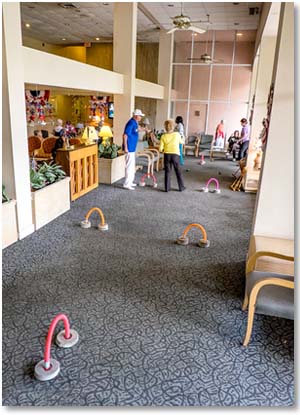
|
| The entire back of the lobby allows maximum exposure of the game to all the residents, who like to gather in the lobby before the first lunch seating at 11:15. |
It took me a while to learn that kind of patience, even as I told myself that I'm lucky my role and Ellie's aren't reversed. I'm about ten years older than she is, and I CAN learn new things, with persistence, practice, and patience with my own gradually failing age-related powers of mind.
Ellie is smartly dressed in a tailored blue suit with a demure small gold necklace around her neck--one she is fortunate to still have, if it's real gold, in an "independent living facility" where petty theft is a common source of supplemental income for the lowly paid CNAs [Certified Nursing Assistants] and other workers. I have talked to Ellie often, and until now, she could have passed for perfectly okay. She would not have seemed out of place at the clubhouse bar. But she has a lot of trouble handling new experience of any kind--including the exceptionally simple game of Carpet Croquet.
All the facilities are operated in the same way
This facility is on the lower end of the economic spectrum, but theft happens in all of them, for the same reason, by the same kind of employees. All the care facilities compete--from one-star to five-star--by hiring employees who will take very low salaries and must augment them by stealing everything re-sellable. Locks provide no security--they're a tip-off that there's something valuable in there. It could be that Ellie wears this necklace around her neck all the time, to make sure she keeps it.
Typically, the "senior care" facilities are operated by management companies for the benefit of real estate investment firms. Top executives of those management companies never have to see the on-the-ground local operations, nor do the board members of the investment firms, who are always looking to the bottom line. If a company doesn't perform, it will be unloaded.
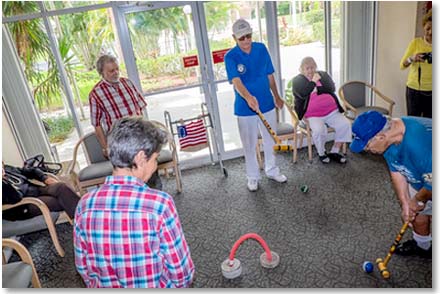
|
| The therpeutic value isn't just for the players--it's also for the spectators, for entertainment and to teach them enough about the simple tactics and strategy of One-Ball Golf Croquet to play it, themselves. Among the many "special rules": spectators are requested to stop balls before the go under their chairs, and the players can take their next turn from that position. |
I know of a once-excellent assisted living facility that "sold out" to another company because it could not match its direct competitors in price, and for a very good reason: the quality care they were paying for was not visible in the lobby or on the first floor! If two facilities look the same--in the daytime, on the first floor--you would naturally choose the least expensive.
The activities director for the facility taken over by a more profitable firm told me, outraged, "They said it was going to be just the same. But it isn't, not at all. They cut every corner they could. And look at this!" Martha pointed to a half-page display in the local paper, advertising to fill all the apartments, and showed me her image--obviously kind, competent, compassionate, and high-toned--smiling from the corner of the ad: "They use my picture to sell this place!"
As in all industries, customers shop around, and managers of the profit-wise senior facility will make sure that its first floor is pristine during daytime hours, and its 9-to-5 staff bright-eyed, high-toned, and thoroughly fit for display to prospective customers. it will look exactly like a more expensive facility which actually provides better care with more and better trained nurses, around the clock and on all the floors of every wing.
What you see is not exactly what you get
The backbone of an assisted living facility is the nursing staff--the people who monitor the residents, push them around in their wheelchairs, change them, bathe them, and generally see to their health and well-being--or not. The salaries paid for those nurses can be the difference between making a hefty profit and just breaking even--which of course is not good enough for stockholders.
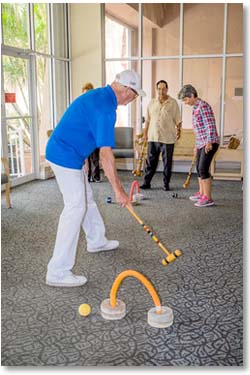
|
| Pointing to the precise best spot is helpful to a player who uses the golf grip surprisingly effectively. A big challenge for these players on this fast surface is learning to use a light touch on a "lawn" that would probably top 12 feet on the Stimp meter. |
In Florida, you can become a Certified Nursing Assistant by taking a three-day training course and passing a test that would be a walk for the average eight-grader. Even though the salaries aren't great, such an opportunity is attractive to many Floridians, especially immigrants, who really need work. They can usually get that work, no questions asked, no resume necessary, with just a CNA certificate.
Many but not all these cheap workers belong to the notoriously over-incarcerated population that feeds the growing industry of "privatized" prisons in Florida and many other states. Many of them may have been sent to prison for nothing more than "walking while black." The real crime is not the theft, but the perpetuation of a profit-centered corporate culture that makes it necessary and actually enables it.
Could video expose and correct these problems? Yes. But no.
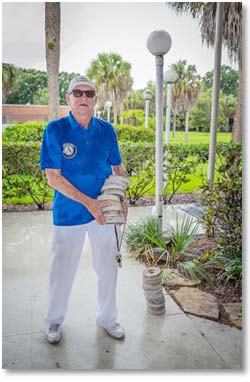
|
| It was raining, so Bob got a little wet getting these concrete circles out of the equipment shed between the pool and the shuffleboard courts. In the background are the trees scattered around a huge "back yard" where an interesting course for SuperSize Croquet can be laid out in the winter season. |
But there are also countless cases of unreported violent crime: physical abuse, actually beatings, and neglect: residents crying out in pain or distress and even being allowed to die, with apparently indifferent CNAs standing nearby and heedless.
And although local staff may suggest putting in video to monitor such abuses and neglect, nobody does it. Video cameras would be a useless expense. The cost of the equipment, of monitoring it, of investigating and prosecuting thieves all would be counter-productive. There's no bottom-line benefit to the company or the shareholders, so it shouldn't be done, and it won't be done.
Most of all, the corporations want to avoid legal liability of any kind, for any reason, and cameras would provide the same discomfiting level of "proof" we've seen in numerous atrocities we've watched municipal police commit this year upon minority populations, as recorded by video.
Seniors for sale in Florida!
There used to be meaningful regulation of most industries, dating back to the "New Deal" innovations of the 30s. But that was long ago. Many states, including Florida, have found ways to render meaningless many of the protections that were once actually useful.
In Florida, because of enabling legislation in 2012 (HB 787, titled "Nursing Homes") that took away regulations intended to protect Florida consumers, this truly remarkable state now allows "brokers" to prey upon seniors and their family members looking for lodgings of any kind. "Patient brokers" now legally advertise a "free service" to consumers who have no idea that they are worth thousands of dollars to these brokers, who will place them in the first senior facility who promises the best price--typically between $3,000 and $5,000 per senior.
With million-dollar budgets provided by giant firms from out of state, these "brokers" can and do cast a very large net, largely shutting out free counseling and referral services already available to the same customers by trained professionals who place seniors on the basis of real compatibility, instead of their cash per capita value. They do nothing useful. They make things worse. And they make lots of money.
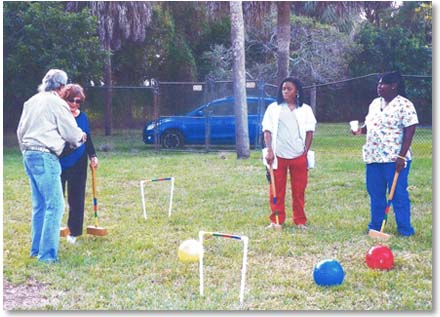
|
| Partnership SuperSize Croquet among the palms pairs one resident and one nurse for each doubles team. |
Florida is often and justly called "God's waiting room," and the senior care industry is prepared to keep a client as long as that client can pay....and only until then. Evictions are messy, but perfectly legal, in all the states. And most of these facilities are fully prepared to move a customer from "Independent Living" to "Assisted Living" in another wing or a different building, and then onto the "Nursing Home," and then.... (In the REI corporate board room, I think they refer to that kind of efficiency as "vertical integration." But I might have it confused with "horizontal integration" which, of course, also works.)
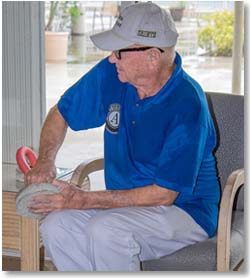
|
| The hoops for Carpet Croquet are made by inserting into holes in the concrete rounds perfectly-sized plastic "wind horns" bought at the dollar store for one buck each. The "hoops" are not needed for the play, but are essential to help residents avoid falling over them. |
Scott's campaign said the Governor had "no direct knowledge" of the fraud, and that Scott had nevertheless "taken responsibility" and resigned his CEO position soon after the biggest case of Medicare fraud in US history became public. Scott's free-enterprise example has been an inspiration to aspiring entrepreneurs of every stripe, the embodiment of the new American dream: getting rich by rigging the system, working it, and getting off "Scott-free."
Even though the Affordable Care Act (aka "Obama Care") was passed with the enthusiastic support of the medical and pharmaceutical lobbies because it promised to provide even greater profit for those industries, millions of people in the United States do not have health insurance of any kind. In Palm Beach County alone, fully a quarter of the population (250,000) are uninsured.
So who is REALLY responsible?
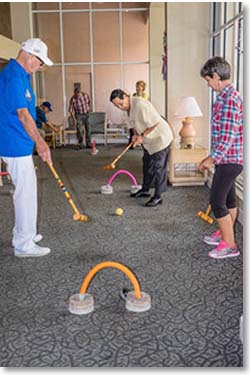
|
But there's always government regulation, you might say. Yes, there is, and it is typically written by lobbying firms working for vested-interest corporations who provide the bulk of the funds the politicians need to be elected and re-elected.
Nothing, it seems, can be done to correct this. And that is especially dispiriting to the genuinely caring and motivated staff of these facilities. The good and compassionate nurses, increasingly unable to find high-quality facilities ethically operated, are dropping out of the profession, leaving the field open to the predators and the equally victimized, underpaid and exploited class of workers they hire.
The true meaning of "American Exceptionalism"
I asked an exceptionally competent and caring activities director with a 9-to-5 job why she stays in the job. What she said reminded me of my own answer when I ask myself, "Why am I doing this volunteer work? I'm just helping the corporation make profits!" Phyllis said, "My son asks me the same question, and I've asked it of myself many times. The truth is, I feel I actually CAN brighten the lives of those people while I'm there, five days a week, just a little, and I have to do that. We can do fun things together. I can't let myself just abandon the most vulnerable people to be preyed upon by...them."
By "them," she means the system. Phyllis and I and many generous and talented staff and volunteers have thus been taken hostage by the system. We confront disturbing images and hear upsetting stories almost every day. We are constantly outraged. We see no possibility of escape. All we can do it try to make a tiny, local difference. All we can do in the face of the system is to gesture.
Also taken hostage by the system are many of the concerned relatives of residents who require, ideally, a high level of institutional care. Typically, they come in to visit their friend or relative many times a week, not just to make sure they're taken care of and properly socialized, but to let the staff know--for what it's worth--that someone who cares is aware of how well or how poorly that resident is being attended to.
 You may be able to handle a small, local problem. But for now, nothing can be done to fix the system. This is the system we have and the one that we deserve. As long as we continue to enable with our votes the kind of "free enterprise" system bent on widening the gap between the very rich and the very poor, the very poor will be exploited and finally wasted by profit-making corporations, and the very rich can spend their billions on exotic medical procedures and round-the-clock home care in their private mansions whenever they need it.
You may be able to handle a small, local problem. But for now, nothing can be done to fix the system. This is the system we have and the one that we deserve. As long as we continue to enable with our votes the kind of "free enterprise" system bent on widening the gap between the very rich and the very poor, the very poor will be exploited and finally wasted by profit-making corporations, and the very rich can spend their billions on exotic medical procedures and round-the-clock home care in their private mansions whenever they need it.
A good life is what you make it
At the same time, it must be said and I will say it now: Many residents in these facilities manage to make good lives for themselves. I put this down to their own human qualities, not the quality of care delivered by the corporation and its staff. Roommates and neighbors and buddies look out for each other. The residents celebrate birthdays and exchange "get well" cards, and sometimes include staff members as well.
And some of the staff are just normally kind and caring human beings, willing to be responsible for the atmosphere around them. But how is, I wonder, that so many people have lived for so long and failed to discover what I call "the irresistible physics of the smile"? (When I smile at you in a friendly way for no particular reason, you smile back, and our smiles energize us and animate our shared surroundings with a contagious atmosphere of good will and cordiality.) Many residents and staff at senior homes influence the shared reality of their institutions by generating vibes that are invariably positive.
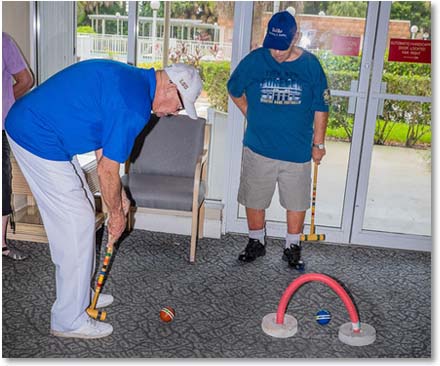
|
| Knocking another ball out of position is an alien thought for seniors more familiar with golf. It's definitely the most "advanced" tactic stroke of this indoor game, and needs to be demonstrated. Although the circular "posts" work very well for this indoor game, they have nothing like the ball/hoop interaction possible in the sport. |
So even though there are residents who insist on being victims of the system and of their relatives (one woman tells me almost every week, bitterly, "My son stuck me in this place") others in exactly the same circumstances participate in every activity available, take all the shopping and adventure excursions done almost daily in the bus or van, and offer a friendly smile to one and all, routinely. How could they not have good lives?
Perhaps they don't even care that we have all become creatures of the military/industrial/scientific/corporate/political establishment, whether we like it or not. Why should they object when a fully-paid-for politician tells us, "What's good for General Bullmoose is good for the country"?
Theirs could be the healthiest individual response to the overweening reality of life in America in the year 2015, where the "free market" system is well on the way to turning everything--including health care and senior care--into commodities to be bought and sold for profit in a truly exceptional country.
|
Some questions about 21st Century technology and medical ethics In the United States and in every advanced or advancing country, the technology exists to extend human life beyond the normal or natural bounds established by evolution. The responsible question: "Is it appropriate and correct to implement that technology, and to what extent?" But religious and ethical considerations have prevented our asking the most difficult of questions about the "unsustainability" of the escalating costs of keeping people alive beyond their "natural" lifespan, although eons ago, the tribes of the far north figured it out: When her teeth were too worn out to soften the whale skin for the tribe, grandma was put onto an ice floe with some warm furs and a pound of blubber while the tribe delivered in song and dance a ceremonial thanks and goodbye as she was pushed off to float to her final destiny. (Rendering her useless, unfortunately, to the Senior Care industry.) The same kind of solution, but kinder and gentler, is actually available now, enabled by 21st Century technology. It was effectively presented in a futuristic horror film of the 70's called "Soylent Green," in which an aged Edward G. Robinson actually enjoys a 21st Century sendoff enabled by beautiful pictures and sweet music, further enhanced by an incredibly wonderful injected drug. His body was then recycled to produce delicious and nutritrous crackers called "Soylent Green" to feed a food-poor world. In both those cases, elderly bodies no longer useful to the tribe were "recycled" in a manner most appropriate to the times and circumstances. In both cases, grandma and Edward G. were given the ceremonial acknowledgement they deserved for their contributions to the shared enterprise of human society. In both cases, the dearly departed had the satisfaction of knowing they would continue to be useful to the biosphere. As it happens, there is a growing movement to allow individuals, as a matter of personal choice, to manage their own exits from a life they no longer consider, for whatever reason, worth living. Physician-assisted suicide has now been de-criminalized by a few countries and some states in the US. For societies who haven't legalized it, assisted death and dying is not only a messy and unnecessarily cruel matter, but made more cruel than necessary by doctors, nurses, family members, and even clergy who are required to use methods that are not nearly as practical as the one used by the northern tribe, or nearly as much fun as the one enjoyed by Edward G. In the year 2015 in the United States and many other countries, people suffering in the end-stages of their lives have to face the likelihood of having no choice at all about how and when they die. Even if they are in great pain, local or national statutes or someone's idea of medical ethics or religious law or even political propriety may not allow them the option of choosing "self-medication" with morphine to ease the pain. If the patient has lapsed into a coma, the family may be required to get a court order to turn off the respirator. If the person continues breathing after that is done, he or she may then, still in bed but unhooked from feeding tubes, be legally starved to death; this may or may not require a court order, depending on the locale. How kind is it to starve someone to death, legally or not? How ethical? Is that what comes, finally, of "playing god" with all the ways humanity has found to more than double the "life expectancy" humans enjoyed just a few thousand years ago? (If you want to find a smidgen of irony in that statement, be my guest.) Let's imagine, for the moment, that we as a global tribe in the 21st Century will find ways to enable much more humane methods of exiting an individual life. And might we further imagine--though it's much harder--a world in which any person, of any age, in any condition, could actually be allowed to make that personal choice with assistance from the medical and government establishments that now are legally compelled to either thwart that purpose or force truly sane and responsible individuals to enable and assist it secretly, shamefully, and off-the-record? It's just a question. But shouldn't we get busy and answer it, and try to end the heartless and cruel deception we are practicing upon ourselves and upon many of the most vulnerable and choice-less members of our human family, by prolonging their suffering needlessly and without their consent? Answering that question is surely possible in the 21st Century, wouldn't you think? Although the human species might have to wait until the 22nd Century to address the efficient recycling of the left-overs. To anyone out there who might be inclined to ask me in outrage: "How can you be so irresponsible as to ask such terrible questions," I answer now with magnified outrage, "How can YOU be so irresponsible as to NOT ask those questions?" If you're under 40--young enough to be my grandchild--you dare not ask those questions aloud, and you might not enjoy the consequence, even, of putting your name on some kind of petition. If you are much younger than the 76 years I have achieved, thanks largely to the medical and pharmaceutical industry, asking that question will put you at great risk of being accused of heartlessness, stupidity, and selfishness. You are too young and fortunate to have needed saving multiple times by modern medicine and technology. (I would be blind if not for the surgical remedies perfected in the last 50 years to repair the retinas repeatedly detached in both eyes. I would be dead if not for the remedies applied after a brain hemorrhage in 2014 and the drugs to control high blood pressure developed only in the last 80 years.) Although I have a good life, I can well imagine some point in the not-too-distant future when I will ask myself, "Is it really worth it to continue living?" In my childhood and in my youth I tried to imagine what it would be like to live until the 21st Century. I would have to be 61 years old to do that! And yet, here I am, still chugging along way beyond the "three score and ten" limit my own grandmother used to cite as the span of life allotted her from somewhere in the Christian bible. Yes, I have signed a legal document that gives a close friend the power to "pull the plug" whenever I may wind up in a vegetative state in hospital, or in some other situation in which he could legally do that. I would hate to think of the consequences to him or anybody who deviated from the letter of the law out of mere compassion for my suffering. But why can't I choose Edward G's solution on my own, if I want to, when I want to, for whatever reason? I tell you this, without reservation: just knowing I have a choice in a supposedly "free" country would be a great comfort. So my final question, in a realm that is absolutely and irrevocably personal, is: Why haven't I been accorded that freedom, and the dignity and peace of mind that comes from being allowed it? The best answer I have is that I must not be allowed to check out "prematurely" because the corporate establishment needs me alive as long as they can make money on my body by keeping it breathing. In the meantime, I have a good life. So why should I complain, when there's nobody, really, to complain to? |
ABOUT THE WRITER AND THE WRITING:
We asked the author how he justified publishing in the only global, independent magazine devoted to the sport of croquet an article which uses "croquet" merely as a launching pad for an editorial. He told us, "Because of what I saw and found out in those places, I was determined to communicate about it. I'm only sorry I didn't persist and get more and better statistics to illustrate the main points. I don't like research very much." As further justification the writer commented, "This might also be a forceful and memorable way of flouting the truly independent charter of a magazine which can assert that independence by publishing stuff that no respectable association or corporation would touch with a six-foot mallet in their official publications."